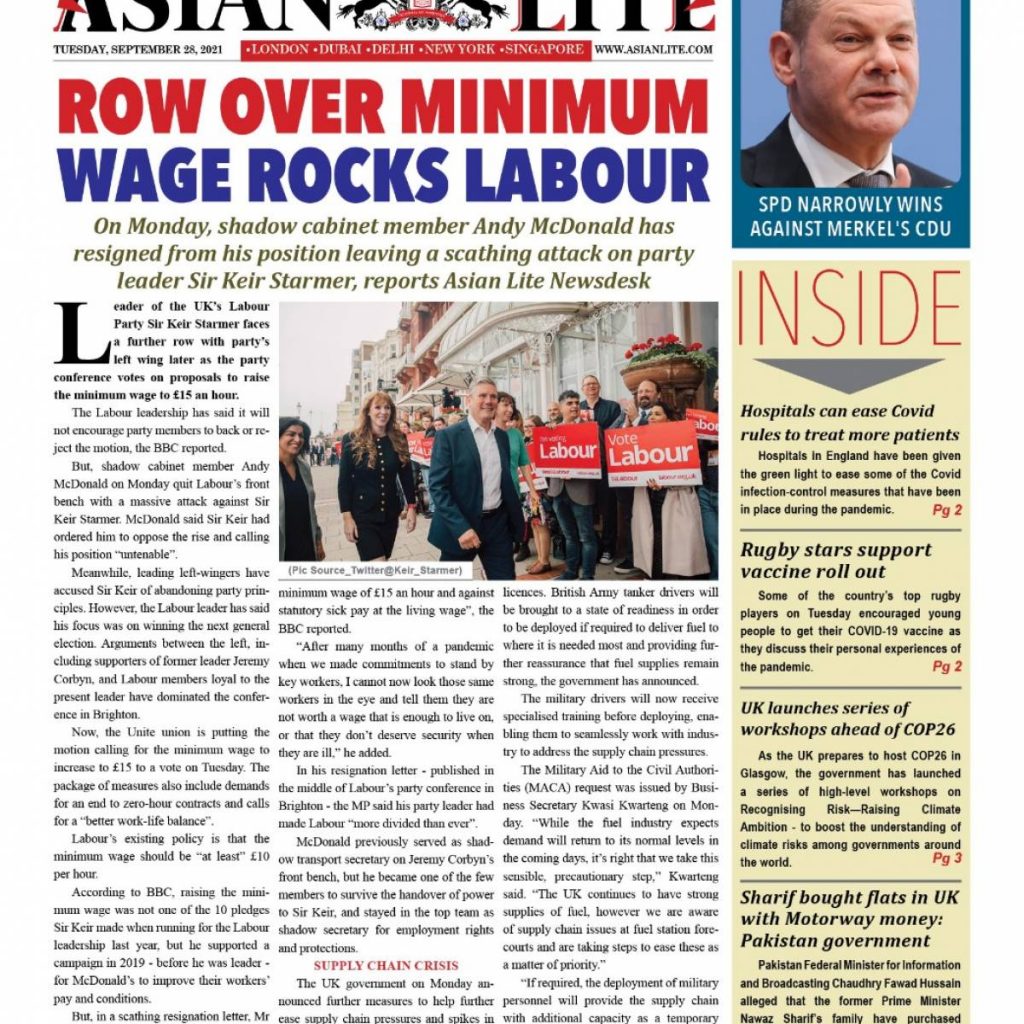On Monday, shadow cabinet member Andy McDonald has resigned from his position leaving a scathing attack on party leader Sir Keir Starmer, reports Asian Lite Newsdesk
Leader of the UK’s Labour Party Sir Keir Starmer faces a further row with party’s left wing later as the party conference votes on proposals to raise the minimum wage to £15 an hour.
The Labour leadership has said it will not encourage party members to back or reject the motion, the BBC reported.
But, shadow cabinet member Andy McDonald on Monday quit Labour’s front bench with a massive attack against Sir Keir Starmer. McDonald said Sir Keir had ordered him to oppose the rise and calling his position “untenable”.
Meanwhile, leading left-wingers have accused Sir Keir of abandoning party principles. However, the Labour leader has said his focus was on winning the next general election.
Arguments between the left, including supporters of former leader Jeremy Corbyn, and Labour members loyal to the present leader have dominated the conference in Brighton.
Now, the Unite union is putting the motion calling for the minimum wage to increase to £15 to a vote on Tuesday. The package of measures also include demands for an end to zero-hour contracts and calls for a “better work-life balance”.
Labour’s existing policy is that the minimum wage should be “at least” £10 per hour.

According to BBC, raising the minimum wage was not one of the 10 pledges Sir Keir made when running for the Labour leadership last year, but he supported a campaign in 2019 – before he was leader – for McDonald’s to improve their workers’ pay and conditions.
But, in a scathing resignation letter, Mr McDonald claimed the leader’s office had instructed him go to a meeting at the party conference and “argue against a national minimum wage of £15 an hour and against statutory sick pay at the living wage”, the BBC reported.
“After many months of a pandemic when we made commitments to stand by key workers, I cannot now look those same workers in the eye and tell them they are not worth a wage that is enough to live on, or that they don’t deserve security when they are ill,” he added.
In his resignation letter – published in the middle of Labour’s party conference in Brighton – the MP said his party leader had made Labour “more divided than ever”.
McDonald previously served as shadow transport secretary on Jeremy Corbyn’s front bench, but he became one of the few members to survive the handover of power to Sir Keir, and stayed in the top team as shadow secretary for employment rights and protections.
Supply chain crisis
The UK government on Monday announced further measures to help further ease supply chain pressures and spikes in localised demand for fuel, including the approval to put on standby a pool of military drivers and extension to specific HGV licences.
British Army tanker drivers will be brought to a state of readiness in order to be deployed if required to deliver fuel to where it is needed most and providing further reassurance that fuel supplies remain strong, the government has announced.
The military drivers will now receive specialised training before deploying, enabling them to seamlessly work with industry to address the supply chain pressures.
The Military Aid to the Civil Authorities (MACA) request was issued by Business Secretary Kwasi Kwarteng on Monday. “While the fuel industry expects demand will return to its normal levels in the coming days, it’s right that we take this sensible, precautionary step,” Kwarteng said.
“The UK continues to have strong supplies of fuel, however we are aware of supply chain issues at fuel station forecourts and are taking steps to ease these as a matter of priority.”
“If required, the deployment of military personnel will provide the supply chain with additional capacity as a temporary measure to help ease pressures caused by spikes in localised demand for fuel,” he added.
Transport Secretary Grant Shapps has authorised an extension to ADR driver licences, which allow drivers to transport goods, such as fuel.
The measure will apply to licences expiring between 27 September 2021 and 31 December 2021, and extend their validity until 31 January 2022. This will provide immediate relief to the shortage of fuel drivers by permitting affected drivers to maximise their available capacity instead of being taken out of circulation for refresher training purposes.
ALSO READ-UK launches visa scheme for truck drivers to meet supply crisis
READ MORE-China eyes its Gobi desert for new inexpensive nuke energy

